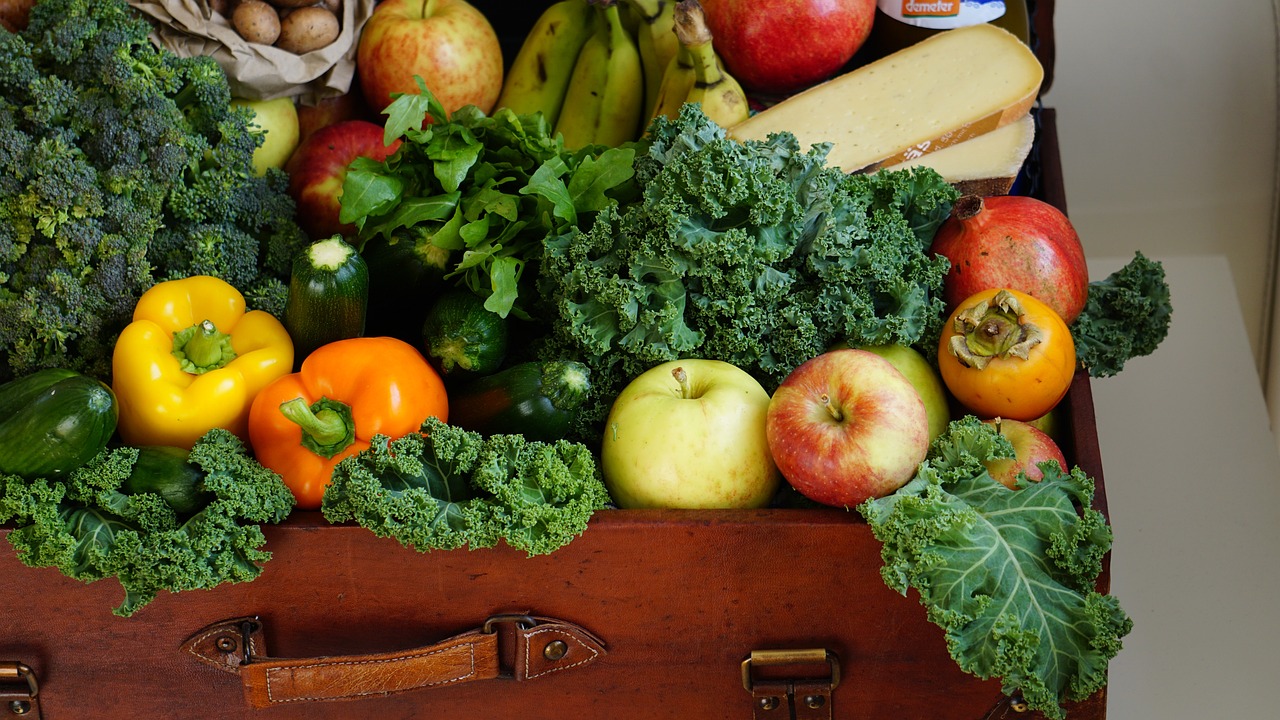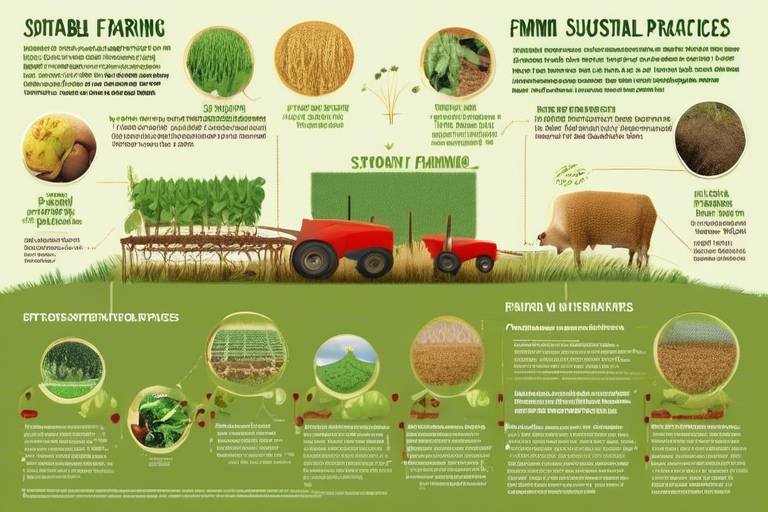The Role of Local Shopping in Sustainable Living
In a world increasingly driven by mass production and globalization, the concept of local shopping emerges as a beacon of hope for sustainable living. When we talk about local shopping, we're not just referring to the act of purchasing goods from nearby stores; it's about embracing a lifestyle that prioritizes our community, environment, and economy. Imagine walking down your neighborhood street, greeted by the warm smiles of local shop owners, each one passionate about their craft. This sense of connection is what makes local shopping not just a transaction, but a vital part of a sustainable future.
So, why should we care about where we shop? For starters, local shopping has a profound environmental impact. By choosing to buy from local businesses, we drastically reduce our carbon footprint. Think about it: every time you purchase a product from a distant warehouse, that item has traveled hundreds, if not thousands, of miles to reach you. This journey often involves numerous transportation methods, each contributing to greenhouse gas emissions. In contrast, local products typically require much less transportation, leading to a smaller environmental impact. It's like choosing to bike to work instead of driving—every little bit helps!
Moreover, shopping locally supports our community's economy. When you spend your hard-earned money at a local store, you're not just buying a product; you're investing in your neighbors' livelihoods. This creates a ripple effect that strengthens our local economy, leading to job creation and stability. Think of it as planting a seed in your community garden—every purchase nurtures the roots of local entrepreneurship, allowing it to flourish and grow.
But the benefits don't stop there. Local shopping also fosters a sense of community engagement. When you support local businesses, you’re not just a customer; you're a part of a larger story. You’re building relationships with the people who live and work around you, creating social connections that enhance your quality of life. This sense of belonging is invaluable, especially in today's fast-paced world where personal connections can often feel fleeting.
Additionally, local businesses often reinvest their profits back into the community, leading to improved infrastructure and services. Think about it: when you shop at a local store, your money is likely to stay within the community, helping to fund parks, schools, and other essential services. It’s like a well-tended garden that thrives on care and attention—your support helps it grow stronger.
In summary, local shopping is more than just a trend; it's a lifestyle choice that empowers us to make a difference. By choosing to shop locally, we not only reduce our environmental impact but also support our economy, foster community engagement, and contribute to the overall well-being of our neighborhoods. So, the next time you're about to make a purchase, ask yourself: Can I buy this locally? Your community—and the planet—will thank you for it.
- What are the environmental benefits of local shopping?
Local shopping reduces transportation emissions, which helps lower your carbon footprint and promotes sustainable practices. - How does local shopping support the economy?
Purchasing from local businesses keeps money within the community, leading to job creation and economic stability. - What are the health benefits of buying local products?
Local products are often fresher and more nutritious, contributing to better overall health. - How can I find local businesses to shop at?
Check local directories, community boards, or social media platforms to discover businesses in your area.

Environmental Impact of Local Shopping
When we think about shopping, it's easy to overlook the profound impact our choices have on the environment. Local shopping is not just a trend; it's a powerful way to reduce our carbon footprints and promote sustainability. By purchasing products from nearby businesses, we significantly minimize the transportation emissions associated with long-distance shipping. Imagine the difference it makes when a fresh loaf of bread travels just a few miles instead of thousands! The reduction in food miles is a vital aspect of sustainable living.
Moreover, local shopping encourages the use of sustainable practices. Many local producers prioritize environmentally friendly methods, whether it’s through organic farming, minimal packaging, or ethical sourcing. When you buy locally, you’re not just supporting a business; you're endorsing a lifestyle that values the planet. This can lead to a ripple effect, inspiring others in the community to adopt similar practices. It's like planting a seed that grows into a tree of sustainability!
Consider this: when you choose to shop locally, you're also supporting businesses that often have a lower environmental impact than larger corporations. Local shops typically have a smaller scale of operations, which means they often consume fewer resources and generate less waste. For instance, many small-scale farmers use regenerative agriculture techniques that enhance soil health and biodiversity, contributing to a more resilient ecosystem.
In addition to reducing emissions, local shopping promotes the use of renewable resources. Many local businesses are more likely to invest in sustainable energy solutions, such as solar panels or energy-efficient appliances. When we support these businesses, we help create a demand for green technologies, which can lead to a broader shift towards sustainable practices in the community.
To illustrate the environmental benefits of local shopping, let’s take a look at a comparison of the carbon footprints associated with local versus non-local products:
| Type of Product | Average Carbon Footprint (kg CO2e) | Distance Traveled (miles) |
|---|---|---|
| Locally Sourced Produce | 0.5 | 50 |
| Imported Produce | 2.5 | 1500 |
This table clearly shows that the carbon footprint of locally sourced produce is significantly lower than that of imported options. By choosing local, you can contribute to a healthier planet, one purchase at a time.
In conclusion, the environmental impact of local shopping is profound and far-reaching. It’s not merely about buying products; it’s about making a conscious choice that benefits our planet, supports our community, and promotes sustainable practices. So, the next time you’re about to make a purchase, ask yourself: Can I buy this locally? Your choices matter, and they can lead to a more sustainable future for all of us.

Supporting Local Economies
When you think of shopping, what comes to mind? For many, it’s the convenience of big box stores or the allure of online shopping. However, there’s a hidden gem in our communities that deserves our attention: local businesses. By choosing to shop locally, you’re not just making a purchase; you’re making a statement. You’re saying, “I care about my community.” This simple act has profound implications for the local economy. When you spend your hard-earned dollars at local shops, you help keep the money circulating within your community, creating a ripple effect that benefits everyone.
Consider this: according to studies, local businesses are known to return approximately three times more money to the local economy than their chain counterparts. This is because local businesses often source their products from other local suppliers, which means that your dollar is not just supporting one business, but a whole network of local entrepreneurs. The impact of this is significant. It leads to job creation, better services, and a vibrant community that thrives on its own resources.
Furthermore, supporting local economies helps to build a sense of community identity. Each local business has its own character, often shaped by the people who run them. When you walk into a local café or shop, you’re likely to be greeted by familiar faces, creating a warm and inviting atmosphere that you simply can’t find in larger chains. This personal touch fosters a sense of belonging, making it easier for people to connect and engage with one another.
But let’s not forget about the economic stability that comes with a robust local market. Local businesses are often more resilient during economic downturns because they are less dependent on global supply chains. They adapt quickly to changes in consumer preferences, and their success is tied directly to the community they serve. When a local business thrives, it contributes to a more stable job market, providing opportunities for residents to find meaningful employment close to home.
To illustrate the impact of supporting local economies, let’s take a look at a few key benefits:
| Benefit | Description |
|---|---|
| Job Creation | Local businesses are significant employers and provide stable jobs within the community. |
| Community Development | Profits from local businesses are often reinvested into the community, leading to better infrastructure and services. |
| Economic Diversification | A strong local economy is more resilient to external economic shocks, ensuring stability for residents. |
In conclusion, supporting local economies is not just about buying products; it’s about investing in the future of your community. Every time you choose to shop locally, you’re contributing to a cycle of prosperity that can lead to a more vibrant, connected, and sustainable community. So the next time you're out shopping, consider where your money is going. Your choices have the power to shape the economy and enhance the quality of life for everyone around you.
- Why should I shop locally? Shopping locally supports your community, creates jobs, and fosters a sense of belonging.
- How does local shopping benefit the environment? Local shopping reduces transportation emissions and supports sustainable practices.
- What types of products can I find locally? You can find a variety of products, including fresh produce, handmade goods, and unique gifts.

Job Creation and Stability
When we talk about , the importance of local shopping cannot be overstated. By choosing to buy from local businesses, we are not only supporting our community but also helping to create and sustain jobs that are vital for our economic health. Local businesses tend to hire locally, which means that the money spent in these establishments circulates within the community, fostering a cycle of economic growth. Imagine a small-town bakery that employs your neighbor; every loaf of bread they sell contributes to their paycheck, which they might spend at the local grocery store or the nearby hardware shop. This interconnectedness is what makes local economies thrive.
Moreover, local businesses often provide stable employment opportunities. Unlike large corporations that may relocate or downsize based on market fluctuations, local businesses are usually more rooted in their communities. They are more likely to weather economic downturns, as they adapt their offerings to meet local needs. This adaptability not only ensures that jobs are preserved but also promotes a sense of job security among employees. For instance, a local restaurant may pivot its menu to include more takeout options during tough times, ensuring that staff can continue to work and earn a living.
Additionally, local businesses tend to have a strong connection to the community, which often translates into a more engaged and motivated workforce. Employees at local shops are more likely to take pride in their work and feel a sense of ownership over their roles. This can lead to higher job satisfaction and lower turnover rates, which are beneficial for both the employee and the employer. In fact, studies have shown that businesses with lower employee turnover rates tend to be more successful in the long run. So, when you shop locally, you’re not just buying a product; you’re investing in the livelihoods of your friends and neighbors.
To illustrate the impact of local shopping on job creation, consider the following table:
| Type of Business | Average Number of Employees | Community Impact |
|---|---|---|
| Local Restaurant | 15-30 | Creates jobs, supports local agriculture |
| Independent Bookstore | 5-10 | Encourages literacy, hosts community events |
| Local Grocery Store | 20-50 | Provides essential goods, employs local residents |
In summary, the act of shopping locally is a powerful tool for promoting job creation and stability within our communities. It fosters a sense of belonging and responsibility, ensuring that we are all part of a larger economic ecosystem that thrives on mutual support. So the next time you’re about to make a purchase, ask yourself: “Am I supporting my community?” By choosing local, you’re not just making a purchase; you’re making a difference.
- Why is local shopping important for job creation?
Local shopping supports businesses that hire local employees, which strengthens the community's economic base. - How does shopping locally affect my community?
Shopping locally keeps money within the community, fostering economic growth and stability, and enhancing social ties. - Are local products more expensive than those from big retailers?
While some local products may be priced higher, the benefits to the community and environment often outweigh the costs.

Community Engagement
When you choose to shop locally, you’re not just making a purchase; you’re investing in your community. It’s like planting a seed that can grow into a flourishing tree, providing shade and fruit for everyone around. Local businesses create a vibrant atmosphere where people know each other, fostering a sense of belonging that is often missing in larger, corporate settings. Think about it: when you walk into a local store, the chances are high that the owner recognizes you, and possibly even remembers your name. This personal touch transforms a simple shopping trip into a social experience.
Moreover, engaging with local businesses encourages social connections. These connections can lead to friendships and partnerships that strengthen community ties. When people shop locally, they often engage in conversations about the products, share recommendations, and even learn about community events. Local shops frequently host gatherings, workshops, and events that bring people together, creating a sense of unity that is essential for a thriving community.
Additionally, when you support local businesses, you’re helping to create a network of support that can withstand challenges. This network is crucial during tough times, like economic downturns or unexpected crises. Local businesses are more likely to reinvest their profits back into the community, whether it’s through hiring local employees, sourcing materials from nearby suppliers, or sponsoring local events. This cycle of support not only enhances the community’s resilience but also enriches the overall quality of life for its residents.
Furthermore, shopping locally can lead to a more engaged citizenry. When people feel connected to their local businesses, they are more likely to participate in community initiatives, volunteer for local causes, or advocate for improvements in their neighborhoods. This active participation can lead to a more vibrant, dynamic community where everyone has a stake in its success. In essence, local shopping is more than just a transaction; it’s a commitment to nurturing the fabric of your community.
In conclusion, community engagement through local shopping creates a ripple effect that benefits everyone involved. It fosters connections, builds resilience, and encourages active participation. So, the next time you think about where to shop, remember that your choice has the power to shape your community for the better.
- Why is local shopping important for community engagement?
Local shopping fosters personal connections and creates a sense of belonging, encouraging residents to engage with one another and their local businesses.
- How does supporting local businesses impact the economy?
Supporting local businesses keeps money within the community, leading to job creation and stronger economic resilience.
- What are some ways to engage with local businesses?
You can engage by attending local events, participating in workshops, or simply striking up conversations with shop owners and employees.

Investment in Local Infrastructure
When you choose to shop locally, you're not just buying a product; you're investing in the very fabric of your community. One of the most significant yet often overlooked benefits of local shopping is its direct impact on local infrastructure. Think about it: every dollar spent at a local business is a dollar that stays within the community, contributing to the development and maintenance of essential services and facilities. This creates a ripple effect that enhances the quality of life for everyone.
Local businesses contribute to infrastructure improvements in several ways. First, they often pay local taxes that fund public services such as schools, parks, and roads. This means that when you support a local shop, you’re also supporting the creation and upkeep of community amenities that everyone can enjoy. For instance, a thriving local market can lead to better public transportation options, improved road conditions, and enhanced recreational facilities. In essence, your choice to buy local helps to create a more vibrant community.
Moreover, local businesses tend to have a vested interest in the community's well-being. They are more likely to advocate for improvements in infrastructure that benefit both their business and their customers. This might include lobbying for better sidewalks, safer streets, or more accessible public spaces. When local entrepreneurs thrive, they become community leaders, driving initiatives that focus not just on profit but on the overall health and sustainability of the area.
To illustrate this point, consider the following table that highlights the benefits of investing in local infrastructure through local shopping:
| Benefit | Description |
|---|---|
| Enhanced Public Services | Local businesses contribute taxes that fund schools, parks, and emergency services. |
| Community Engagement | Local shops often participate in community events, fostering social connections. |
| Advocacy for Improvement | Local business owners are more likely to push for infrastructure improvements that benefit the community. |
| Job Creation | Investing in local businesses leads to job stability and growth, which can spur further investment. |
In conclusion, the investment in local infrastructure through local shopping is a multifaceted benefit that enhances not only the economy but also the overall quality of life. By choosing to support local businesses, you are playing a pivotal role in creating a community that is not just sustainable but also resilient and engaging for all its residents.
- Why should I shop locally? Shopping locally supports your community, reduces environmental impact, and helps create jobs.
- How does local shopping impact the environment? It minimizes transportation emissions and encourages sustainable practices.
- What are the health benefits of buying local products? Local products are often fresher and more nutritious, leading to better health outcomes.
- Can local businesses really make a difference? Absolutely! They contribute to local infrastructure, create jobs, and foster community connections.

Economic Resilience
Shopping locally does more than just support your neighborhood store; it plays a crucial role in fostering within the community. Imagine a vibrant community where businesses thrive, jobs are plentiful, and the local economy is robust enough to weather storms. This is the power of local shopping! By choosing to buy from local businesses, you are directly contributing to a diverse economy that is less vulnerable to external shocks. When a community relies on a mix of local businesses, it creates a buffer against economic downturns, ensuring that even when larger, national chains struggle, the local economy remains intact.
One significant aspect of economic resilience is the concept of multiplier effects. When you spend money at a local shop, that money tends to circulate within the community rather than leaving it. Local businesses often source their products from other local suppliers, pay local taxes, and employ local residents. This creates a cycle of economic activity that benefits everyone. For example, when you buy a coffee from a local café, the owner might use that profit to purchase pastries from a nearby bakery, and that bakery might hire local students as part-time staff.
Moreover, local shopping helps to diversify the economy. A community that relies heavily on a single industry can be left vulnerable if that industry faces challenges. However, by supporting a variety of local businesses—from farmers’ markets to artisanal shops—you encourage a more stable economic environment. This diversity not only strengthens the local economy but also fosters innovation. Local entrepreneurs are more likely to experiment with new ideas and products, which can lead to exciting developments that keep the community fresh and dynamic.
It's also essential to recognize the role of local businesses in community development. When you shop locally, you are investing in your community's future. Local business owners are often more invested in the well-being of their community compared to large corporations. They contribute to local causes, sponsor events, and participate in community planning. This involvement creates a sense of ownership and pride among residents, further solidifying the community's resilience.
In conclusion, the act of shopping locally is a powerful tool for building economic resilience. By supporting local businesses, you not only help your community thrive but also contribute to a more stable and diverse economy. So next time you consider where to shop, remember that your choices have a ripple effect that can lead to a stronger, more resilient community.
- Why is local shopping important for the economy?
Local shopping keeps money within the community, supporting local businesses and creating jobs. - How does shopping locally help the environment?
Local shopping reduces transportation emissions and supports sustainable practices. - What are the health benefits of buying local?
Local products are often fresher and more nutritious, contributing to better health. - How can I find local shops in my area?
Check online directories, local business associations, or community bulletin boards.

Health Benefits of Local Products
When it comes to our health, the source of our food can make a world of difference. Buying local products often means you're getting fresher and more nutritious options. Think about it: when you purchase fruits and vegetables from a local farmer's market, you're likely getting produce that was harvested just a day or two ago, rather than items that have been shipped across the country or even internationally. This freshness not only enhances the flavor but also means that the food retains more of its vital nutrients. Nutrients like vitamins and antioxidants start to degrade over time, so the shorter the distance from farm to table, the better!
Another significant benefit of shopping locally is the reduction of food miles. Food miles refer to the distance food travels from where it's grown to where it's consumed. The longer the distance, the more emissions are produced through transportation, contributing to climate change. By opting for local products, you can dramatically cut down on these food miles. For example, consider the difference between a tomato that traveled 1,500 miles versus one that was grown in your local community. The local tomato is not only fresher but also has a much lower environmental impact. This is a win-win situation for both your health and the planet!
Moreover, local products often come from farms that prioritize sustainable practices. Many local farmers are dedicated to organic farming methods that avoid harmful pesticides and fertilizers. By choosing local, you're not just supporting your health but also the health of the environment. You’re investing in a food system that values biodiversity and sustainability. This means that when you buy local, you're more likely to be consuming food that is free from harmful chemicals and packed with flavor.
In addition to the nutritional advantages, shopping locally can also have a positive impact on your overall well-being. There's something inherently rewarding about knowing where your food comes from and the people who grow it. This connection fosters a sense of community and trust, enhancing your relationship with food. When you buy from local farmers or artisans, you’re not just a consumer; you’re part of a story. You’re supporting your neighbors and contributing to the local economy, which in turn creates a more vibrant community.
To illustrate the health benefits of consuming local products, here’s a quick comparison of local versus non-local produce:
| Criteria | Local Produce | Non-Local Produce |
|---|---|---|
| Freshness | Harvested within days | Often harvested weeks ago |
| Nutrient Retention | Higher nutrient levels | Lower nutrient levels |
| Environmental Impact | Low food miles | High food miles |
| Support for Local Economy | Directly supports local farmers | Funds large corporations |
In conclusion, the health benefits of local products are numerous and significant. From fresher, more nutritious food to the positive effects on the environment and community, choosing local is a choice that pays dividends in multiple ways. So, the next time you're at the store or market, consider reaching for that local produce. Your body, your community, and the planet will thank you!
- Why should I buy local products? Buying local supports your community, reduces environmental impact, and provides fresher, more nutritious food.
- Are local products always organic? Not all local products are organic, but many local farmers use sustainable practices that avoid harmful chemicals.
- How can I find local products? Check out local farmers' markets, community-supported agriculture (CSA) programs, or farm-to-table restaurants.
- What are food miles? Food miles refer to the distance food travels from where it is grown to where it is consumed, impacting freshness and environmental sustainability.

Nutrition and Freshness
When it comes to food, freshness is not just a buzzword; it’s a key ingredient for a healthier lifestyle. Think about it: when you purchase locally sourced produce, you're not only supporting your community but also indulging in fruits and vegetables that are often harvested at their peak ripeness. This means they are packed with essential nutrients that can be lost during long transportation times. Have you ever bitten into a store-bought tomato only to find it bland and mealy? That's because it likely traveled thousands of miles to reach your plate. In contrast, locally grown produce can go from farm to table in a matter of hours or days, ensuring you get the best flavor and nutrition.
Consider the journey of food. When you shop locally, you’re reducing the time it takes for your food to reach you, which in turn reduces the chances for spoilage and nutrient degradation. For instance, a study found that food can lose up to 30% of its nutrients when it sits in storage or travels long distances. By choosing local, you’re not just making a purchase; you’re making a choice for your health. It’s like choosing to drink freshly squeezed orange juice instead of the bottled stuff that’s been sitting on the shelf for months.
Moreover, local farmers often grow a diverse range of crops, which means you’re more likely to encounter seasonal varieties that are not only tastier but also more nutritious. Seasonal eating aligns with nature’s cycle, providing your body with what it needs at different times of the year. For example, during the winter months, root vegetables like carrots and beets are at their prime, offering hearty nutrients that can help boost your immune system. In the summer, you can enjoy a bounty of vibrant fruits and leafy greens, which are perfect for hydration and energy.
To illustrate the differences in nutrition between local and non-local produce, consider the following table:
| Type of Produce | Average Days from Farm to Table (Local) | Average Days from Farm to Table (Non-Local) | Nutrient Loss (%) |
|---|---|---|---|
| Tomatoes | 1-2 days | 7-14 days | 30% |
| Spinach | 1-3 days | 5-10 days | 25% |
| Apples | 1-3 days | 30-60 days | 15% |
In conclusion, shopping locally not only supports your community but also enhances your diet with fresher, more nutritious options. It's about making informed choices that benefit both your health and the environment. So next time you're at the store or a farmers' market, think about the journey of your food. Choosing local is a delicious way to nourish your body while also caring for the planet!
- Why is local produce better for my health? Local produce is often fresher, which means it retains more nutrients compared to items that have traveled long distances.
- How can I find local farmers or markets? Many communities have farmers' markets or local co-ops. Websites like LocalHarvest.org can help you find options near you.
- Are local products always more expensive? Not necessarily! While some local products may cost more, many are competitively priced, especially when you consider the quality and freshness.
- What are the environmental benefits of shopping locally? Local shopping reduces transportation emissions, supports sustainable farming practices, and helps maintain local ecosystems.

Reduction of Food Miles
The term food miles refers to the distance food travels from where it is grown or produced to where it is consumed. In today's fast-paced world, many of us are unaware of the journey our food takes before it reaches our plates. By choosing to shop locally, we can significantly reduce these food miles, which in turn has a profound impact on our environment. Think about it: every time you buy a locally sourced product, you are not just supporting your community; you are also making a conscious choice to minimize the carbon emissions associated with long-distance transportation.
When food travels long distances, it often requires various forms of transportation—trucks, planes, and ships—all of which contribute to greenhouse gas emissions. According to a study by the Food and Agriculture Organization (FAO), transportation can account for up to 11% of global greenhouse gas emissions. By reducing food miles, we can help cut down this significant source of pollution. For instance, consider the difference between a tomato grown in your backyard versus one shipped from a different continent. The local tomato not only tastes better but also has a much lower environmental impact.
Additionally, local shopping often means fresher produce. When food is grown nearby, it can be harvested at its peak ripeness and delivered to consumers quickly. This means more nutrients and flavors are preserved, providing a better eating experience. In contrast, food that travels thousands of miles is often picked before it is ripe, leading to a loss in nutritional value and taste. This is particularly important when considering the health benefits of consuming fresh, local produce.
Furthermore, shopping locally can lead to a more sustainable food system. By supporting local farmers and producers, we encourage practices that are often more environmentally friendly, such as organic farming and crop rotation. These methods not only reduce the need for harmful pesticides and fertilizers but also promote biodiversity, which is essential for a healthy ecosystem.
To illustrate the concept of food miles, let's take a look at the following table:
| Food Item | Distance Traveled (Miles) | Environmental Impact |
|---|---|---|
| Local Tomatoes | 10 | Low |
| Imported Tomatoes | 1,500 | High |
| Local Apples | 20 | Low |
| Imported Apples | 3,000 | High |
As you can see from the table, the difference in distance traveled and environmental impact between local and imported food items is staggering. By choosing local options, not only do we support our farmers, but we also take a stand for a healthier planet.
In conclusion, reducing food miles is a simple yet effective way to contribute to a more sustainable lifestyle. By prioritizing local shopping, we can enjoy fresher, more nutritious food while simultaneously reducing our carbon footprint. It's a win-win situation—one that benefits our health, our communities, and our planet.
- What are food miles? Food miles refer to the distance food travels from production to consumption, impacting its environmental footprint.
- How can I reduce my food miles? You can reduce food miles by shopping at local farmers' markets, joining a community-supported agriculture (CSA) program, or buying from local grocery stores.
- Why is buying local better for my health? Local produce is often fresher and more nutritious, as it is harvested at its peak and travels shorter distances.
- What impact do food miles have on the environment? Longer transportation distances contribute to higher greenhouse gas emissions, which can lead to climate change.
Frequently Asked Questions
- What are the environmental benefits of local shopping?
Local shopping significantly reduces carbon footprints by minimizing transportation emissions. When you buy products from nearby vendors, you're not only supporting the local economy but also contributing to a healthier planet. It's like giving Mother Earth a little hug every time you choose local!
- How does shopping locally support the community?
When you shop locally, your money stays within the community, helping to create jobs and stabilize the economy. It's a win-win! Supporting local businesses means you're investing in your neighbors and fostering a thriving community atmosphere.
- What impact does local shopping have on job creation?
Local businesses often provide stable employment opportunities. By choosing to shop locally, you're helping to create and sustain jobs, which leads to a more resilient workforce. Think of it as building a safety net for your community's economy!
- Why is community engagement important in local shopping?
Engaging with local businesses fosters a sense of community. When you shop at local stores, you meet your neighbors, form connections, and strengthen community ties. It’s about creating a vibrant social fabric that enhances everyone's quality of life.
- How does local shopping contribute to economic resilience?
Local shopping diversifies the local economy, making it more resilient against economic downturns. A strong local market can better withstand challenges, so when you buy local, you're not just supporting a store; you're bolstering the entire community's economic health!
- What health benefits come from buying local products?
Buying local often means you're getting fresher, healthier products. Local produce is typically harvested at its peak, ensuring better nutrition and flavor. It's like having a mini farmer's market right in your neighborhood!
- How does local shopping reduce food miles?
Minimizing food miles is crucial for sustainability. When you purchase locally sourced food, you're cutting down on the distance it travels from farm to table. This not only reduces environmental impact but also means fresher options for you and your family.



















